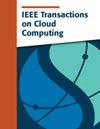Advancing Sustainability in Data Centers: Evaluation of Hybrid Air/Liquid Cooling Schemes for IT Payload Using Sea Water
IF 5.3
2区 计算机科学
Q1 COMPUTER SCIENCE, INFORMATION SYSTEMS
引用次数: 0
Abstract
The growth in cloud computing, Big Data, AI and high-performance computing (HPC) necessitate the deployment of additional data centers (DC’s) with high energy demands. The unprecedented increase in the Thermal Design Power (TDP) of the computing chips will require innovative cooling techniques. Furthermore, DC’s are increasingly limited in their ability to add powerful GPU servers by power capacity constraints. As cooling energy use accounts for up to 40% of DC energy consumption, creative cooling solutions are urgently needed to allow deployment of additional servers, enhance sustainability and increase energy efficiency of DC’s. The information in this study is provided from Start Campus’ Sines facility supported by Alfa Laval for the heat exchanger and CO2 emission calculations. The study evaluates the performance and sustainability impact of various data center cooling strategies including an air-only deployment and a subsequent hybrid air/water cooling solution all utilizing sea water as the cooling source. We evaluate scenarios from 3 MW to 15+1 MW of IT load in 3 MW increments which correspond to the size of heat exchangers used in the Start Campus’ modular system design. This study also evaluates the CO2 emissions compared to a conventional chiller system for all the presented scenarios. Results indicate that the effective use of the sea water cooled system combined with liquid cooled systems improve the efficiency of the DC, plays a role in decreasing the CO2 emissions and supports in achieving sustainability goals.推进数据中心的可持续性:评估使用海水的IT有效载荷的混合空气/液体冷却方案
云计算、大数据、人工智能和高性能计算(HPC)的增长需要部署额外的高能耗数据中心(DC)。计算芯片的热设计功率(TDP)的空前增长将需要创新的冷却技术。此外,由于功率容量的限制,数据中心在添加强大的GPU服务器方面的能力越来越有限。由于冷却能耗占直流能耗的40%,因此迫切需要创造性的冷却解决方案,以允许部署额外的服务器,增强可持续性并提高直流的能源效率。本研究中的信息由阿法拉伐公司支持的Start Campus的Sines设施提供,用于换热器和二氧化碳排放计算。该研究评估了各种数据中心冷却策略的性能和可持续性影响,包括纯空气部署和随后使用海水作为冷却源的混合空气/水冷却解决方案。我们评估了从3兆瓦到15+1兆瓦IT负载的场景,增量为3兆瓦,对应于Start Campus模块化系统设计中使用的热交换器的大小。本研究还评估了二氧化碳排放量相比,传统的冷水机组系统的所有提出的方案。结果表明,海水冷却系统与液冷系统的有效结合提高了直流系统的效率,减少了二氧化碳的排放,有助于实现可持续发展目标。
本文章由计算机程序翻译,如有差异,请以英文原文为准。
求助全文
约1分钟内获得全文
求助全文
来源期刊

IEEE Transactions on Cloud Computing
Computer Science-Software
CiteScore
9.40
自引率
6.20%
发文量
167
期刊介绍:
The IEEE Transactions on Cloud Computing (TCC) is dedicated to the multidisciplinary field of cloud computing. It is committed to the publication of articles that present innovative research ideas, application results, and case studies in cloud computing, focusing on key technical issues related to theory, algorithms, systems, applications, and performance.
 求助内容:
求助内容: 应助结果提醒方式:
应助结果提醒方式:


